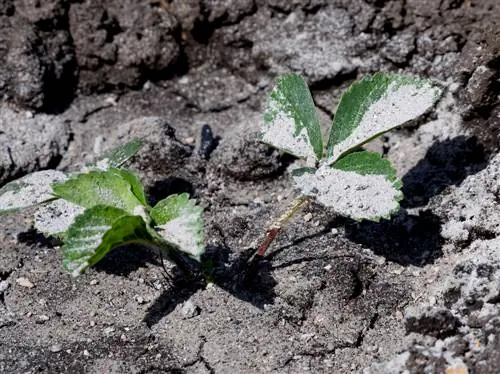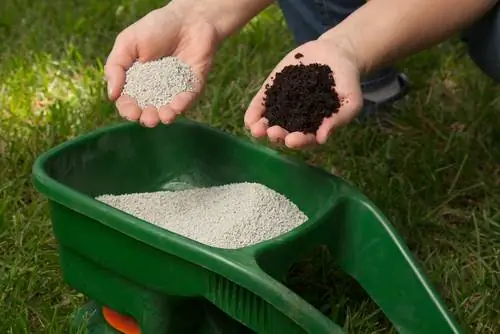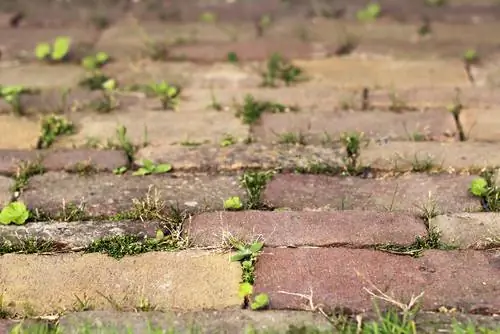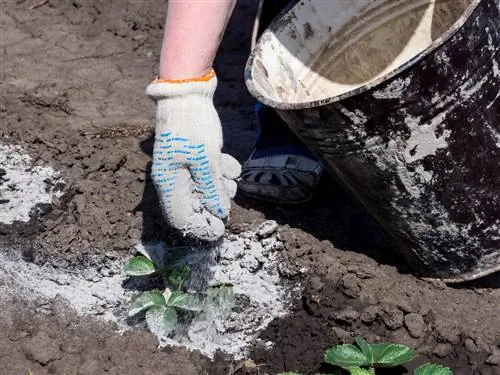- Author admin leonars@hobbygardeners.com.
- Public 2023-12-16 16:46.
- Last modified 2025-01-23 11:22.
Stone dust is extremely versatile in the garden and is suitable for soil improvement as well as for combating fungal diseases, pests and weeds. In this article we will tell you how this works and what you should pay attention to.
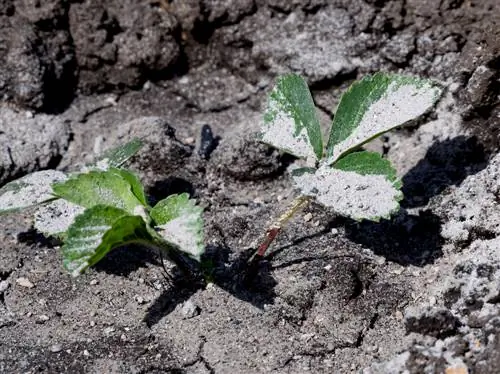
What is stone dust used for in the garden?
Stone dust is a finely ground rock that can be used to improve soil and control pests and diseases in the garden. Use volcanic rock such as bas alt or diabase to improve soil and granite to control pests or fungal diseases.
- Stone dust is very finely ground rock.
- Use different types depending on the purpose.
- Stone dust from volcanic rock is suitable for soil improvement and for making compost.
- Other varieties can be used to combat fungal diseases and pests.
What is stone powder?
Stone flour or rock powder is exactly what its name suggests: very finely ground rock. However, not just any stone is used, because different types of stone with different properties are used depending on the intended purpose. Rock types like are often found
- Bas alt (and other volcanic rocks)
- Diabas
- Granite
- Limestone
- Clay minerals (bentonite)
- or zeolite
Use because they can be used very well in the garden due to their high content of minerals and trace elements. The soil-improving properties of clay, volcanic rock and marl were already known in ancient times. According to German law, stone powder is not considered a fertilizer, but is classified as a soil additive.
Excursus
Is there a difference between stone powder and primary rock powder?
In fact, there is a serious difference between stone powder and primary rock powder. The latter consists of rocks of volcanic origin, which contain a high proportion of valuable minerals and trace elements such as calcium, iron and magnesium and are therefore perfect for use in the garden. Primary rock flour improves the soil, promotes humus formation and ensures better water storage capacity. Stone powder, in turn, can also consist of other types of stone with completely different properties, for example clay minerals.
Application options
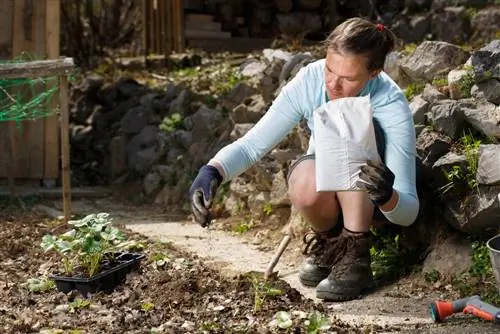
Stone dust is primarily used to improve soil
Depending on the type of rock used, stone powder can be used for very different purposes. The fine powder is particularly often used to improve the garden soil and its structure, and is also used to combat pests and diseases on plants, to produce plant manure and compost, and in construction work.
Stone dust as a soil improver
“Primitive rock flour is not a fertilizer, but a soil additive. As a result, it is not suitable for correcting nutrient deficiencies!”
To improve the soil, you should use primary rock powder, as only rocks of volcanic origin have the necessary proportions of minerals and trace elements. Even though this stone powder is rich in iron, magnesium and calcium, it is not considered a fertilizer - the reason for this classification is that the main nutrients nitrogen, phosphorus and potassium are missing or only contained in small quantities. Nevertheless, the use of primary rock powder as a soil additive offers a whole range of advantages for garden soil and plants:
- Increasing water storage capacity: Sandy soils in particular benefit from enrichment with clay powder, as these improve the water storage capacity of these very permeable substrates.
- Improvement of soil life: The minerals and trace elements contained in stone dust are immediately available to soil organisms, so that they contribute directly to humus formation. The higher humus content in turn benefits vegetables and other garden plants without them being threatened by possible over-fertilization.
- Increasing soil fertility: Rock powder contains many important minerals and trace elements that are enriched directly in the garden soil and thus increase its quality. At the same time, the soil structure becomes more crumbly and loose. In addition, depending on the type of rock used, stone dust is suitable for improving a pH value that is too low.
- Slow plant availability: Since the stone powder has to completely weather before the plants can absorb the nutrients it contains, there is no risk of over-fertilization - instead, there is a slow and very gradual release to the plants.
Suitable types of stone powder
There are different primary rock flours that consist of different source rocks. We have put together a clear overview of what rock powder is best for you to use in the garden in this table.
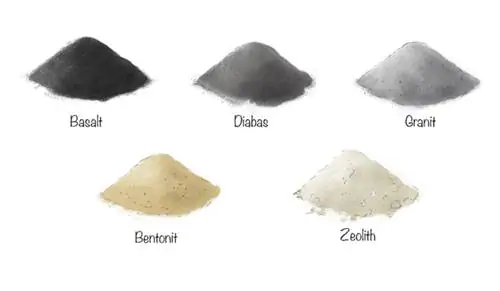
| Source rock | Key ingredients | Possible areas of application |
|---|---|---|
| Bas alt | Iron, magnesium, other minerals and trace elements | Supply of minerals and trace elements, increasing soil life in the garden soil and in the compost |
| Diabas | Iron, magnesium, other minerals and trace elements, especially calcium | Supply of minerals and trace elements, increasing soil life in garden soil and compost, lowering the pH value of excessively alkaline soils |
| Granite | lower mineral content | Increasing soil life in garden soil and compost, lowering the pH of excessively alkaline soils |
| Bentonite | Clay minerals | Improving water storage capacity, improving the ratio of clay and humus, especially for sandy soils |
| Zeolite | lower mineral content | Improvement of water storage capacity, strong alkaline effect |
Tip
You should use lava flour when caring for heavy-consuming plants such as tomatoes and lawns. This contains the highest proportion of micronutrients and is therefore particularly suitable for this purpose.
Dosage
How you dose the rock powder depends on various factors. Above all, the composition of the garden soil and its pH value as well as the specific product selected determine how much of the material you should or are allowed to spread. Therefore, study the manufacturer's recommendations carefully and be sure to measure the pH value of your garden soil before use. In order for a noticeable effect to occur, the material must be applied regularly - usually annually - applying it once or twice usually does not produce any noticeable results.
Application
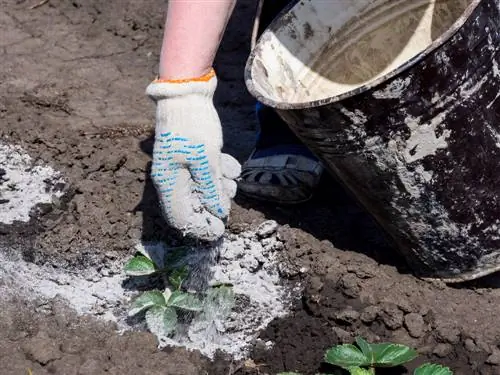
Stone dust can be sprinkled directly onto the soil
Rock dust can either be spread and worked into the soil or dissolved in liquids (such as irrigation water or plant manure) and applied in this way. The material is also very suitable for stimulating microbial life in the compost and thus accelerating the decomposition of the organic material - not to mention that the nutrients contained in the stone dust are also added to the compost and thus enrich it with minerals.
You can basically spread primary rock powder in three ways:
- sprinkle dry directly onto the ground (e.g. between rows of vegetables)
- work into the soil (e.g. when digging, when planting)
- dissolve in water or plant manure and water plants
To incorporate the rock dust into the soil, proceed as follows:
- Choose a calm, dry day in spring or late autumn.
- Wet the soil well beforehand so that the fine flour doesn't blow away.
- Apply the rock dust directly to the beds.
- Wear a face mask and respiratory protection!
- Work the material into the ground with a hoe.
- The stone dust should be worked into the soil about three to five centimeters deep, as it is best absorbed there by the roots.
During the growing season, just add the stone powder to the irrigation water or a self-made plant manure. The latter also offers the advantage that the brew smells less intensely - the material binds the unpleasant smell.
Excursus
How do I know what pH value my garden soil has?
You can determine the pH value of the garden soil with a simple test from the pharmacy or garden store. To do this, you need test strips (€12.00 at Amazon), which you place in a soil sample mixed with a little water (be sure to follow the manufacturer's instructions!). Based on their discoloration, you can then tell whether the soil is alkaline (basic) or acidic. Then select the appropriate rock dust to neutralize the respective acidity.
Plant protection
Stone dust is not only suitable for soil improvement, but can also be used as a pesticide to combat pests and fungal diseases. Rock types rich in silica, such as granite, are particularly ideal for this purpose and ward off both animal and fungal attackers.
Tip
Be careful! Some plants do not tolerate stone powder. These primarily include plants with a preference for acidic soils such as hydrangeas, rhododendrons and azaleas, camellias and blueberry bushes.
Against fungal diseases
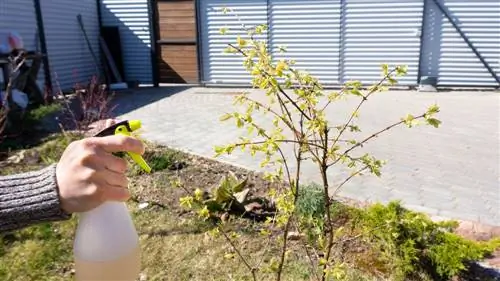
When mixed with water, stone dust is a great remedy against fungal diseases
Silicic acid strengthens plant tissue and makes it less susceptible to the invasion of fungal pathogens. To ensure that your plants benefit from this property, make a spray mixture from granite or other stone powder containing silica:
- Mix 200 grams of stone powder with a little water.
- Gradually dilute the mixture with ten liters of water.
- Pour the spray into a spray device.
- Spray endangered plants once a week.
- Spray on an overcast day or early in the morning
If you don't use the entire amount right away, you can save the rest until the next use. However, the spray mixture should then be stirred thoroughly first, as the stone powder will settle.
Against pests
If you have problems with pests such as lice, spider mites (red spiders), thrips, etc., it helps to regularly powder the plants in question with stone powder. The fine dust prevents the insects from breathing and moving, which is why the animals quickly disappear. Apply the stone dust dry to the plants, for example with the help of a powder syringe or with a hand brush (dip the hand brush into the flour and then shake it out over the plants). The best time of day for this project is early in the morning, when the plants are still damp with dew. By the way, rock dust is particularly suitable as a preventive agent against the notorious boxwood moth.
Against snails
Snails are probably the biggest nuisance in every garden. It is often difficult to stop the voracious little animals from eating the lettuce and other delicious vegetables and ornamental plants. With a thick protective ring made of stone powder that is approximately five to ten centimeters wide, you can keep snails away from your garden plants and at the same time ensure that the soil and plants receive an extra portion of minerals. On the other hand, an odorous paste made from stone powder and crushed garlic as well as chopped onions, which you put into the rodents' burrows, should help against voles.
Against weeds in joints

Joints between paving slabs or patio tiles tend to quickly become overgrown with weeds. If you don't want to constantly pull out cheeky weeds, you have no choice but to close these gaps tightly. However, many joint agents - for example silicone - do not allow rainwater to seep through. However, if you fill it with stone powder, the joints will seal tightly against weeds and still allow water to pass through. The fine-grained material fills even the smallest cavities and also lowers the pH value in the area treated with it - so weeds have no chance.
However, do not use just any stone dust for this purpose, but use granite powder that is as low in nutrients as possible. This type of stone contains only a few growth-promoting minerals and is also prepared specifically as a joint agent by some manufacturers (such as Dansand). Stone powder for grouting is available in different colors to match the color of the terrace tiles or paving stones.
Where can I get stone powder?
You can generally get stone powder in every hardware and gardening store, and you can also find cheap offers in discounters from time to time. However, before you access it, read the table of contents first. Not every stone powder is suitable for every purpose and the cheap discounter offers in particular often contain mainly sand-lime brick or granite - both of which are useless for soil improvement. If you are specifically looking for primary rock powder, be particularly careful: Since this name is not legally protected, high-quality lava rock is not always used for it.
Frequently asked questions
Is stone powder poisonous?
No, stone powder is not poisonous. There are even varieties that are suitable for human consumption (and are supposed to be good for your he alth, but is that really true?). However, the material is so fine-grained that it is easily inhaled when used and then enters the respiratory organs. Here again, the fine but still quite sharp stone powder can cause painful irritation. Therefore, always work with respiratory protection if possible.
How much does stone powder cost?
The prices for stone powder vary and depend heavily on which product you want to purchase and in which pack size. Depending on whether it is a well-known brand or a discount product, the material can be both expensive and cheap. The composition is also relevant to the price: higher-quality stone powder made from lava rock is generally more expensive than cheaper versions made from sand and limestone. So it's not the price that decides here, but the desired application.
If possible, always choose large packages weighing 25 kilograms or more. These are cheaper per kilo, and you will also need quite large quantities of them if you want the product to really deliver visible results in the garden. Stone dust basically lasts indefinitely once it is kept dry.
What alternatives are there to stone powder?
Depending on what you do with it and what you want to achieve, you have different alternatives to stone flour. You can also use garden lime to improve the soil if the pH value is acidic. Compost or rotted manure are very suitable for normal soil. These materials also have a fertilizing effect, which stone powder cannot serve. Algae lime also helps against pests, and home-made plant manure, for example based on nettle or horsetail, is suitable for combating and preventing plant diseases.
Tip
Instead of liming the fruit trees in winter to protect them from pests and frost cracks, you can also use clay powder mixed with water. This protects just as well against cold damage and seals up the loopholes that many pests like to use as winter quarters.

